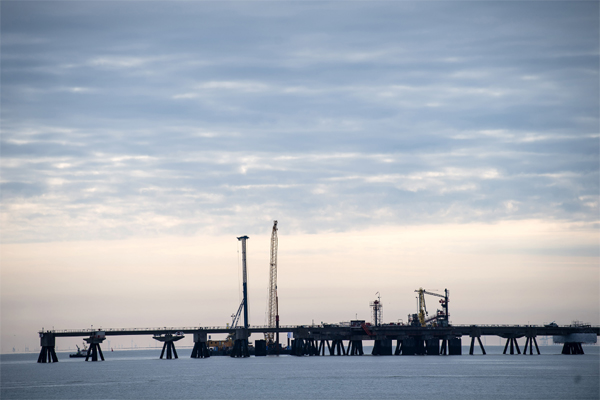
Arne Delfs and Vanessa Dezem, Bloomberg News
BERLIN/FRANKFURT
EnergiesNet.com 05 09 2022
Germany signed contracts to charter four floating terminals to import liquefied natural gas in partnership with utilities RWE AG and Uniper SE as it races to reduce its energy dependence on Russia.
Shipping companies Hoegh LNG and Dynagas will each provide two of the LNG terminals — which together have the capacity to convert at least 20 billion cubic meters of the super-cooled gas per year, about a fifth of Germany’s needs, the economy ministry said Thursday in an emailed statement. RWE and Uniper will operate them, it added.
“Today, more than ever, we have to base our energy supply on more robust pillars,” Economy Minister Robert Habeck said in the statement. “Supply security can only be guaranteed in the long term if we think about this alongside the development of infrastructure for LNG.” Some of the world’s major LNG exporters include the U.S., Australia and Qatar.
European countries are seeking to rapidly diversify their energy supplies to punish Russia over its invasion of Ukraine. Moscow last month unexpectedly cut off gas shipments to Poland and Bulgaria due to a payments dispute, underscoring the urgency of the task of reducing dependence on Russian fossil fuels.
Germany has already cut the share of Russian gas in its imports to about 35% since the invasion of Ukraine, from around half, and is aiming to reduce it to 10% by the summer of 2024. It has also signed up to European Union embargos on Russian oil and coal that will take effect through the rest of this year.
The government has allocated 2.94 billion euros ($3.1 billion) to pay for the floating LNG terminals and for the necessary infrastructure to connect them to the network, the economy ministry confirmed.
The plan is for the first terminal to go online at Wilhelmshaven on Germany’s northwest coast around the end of this year, with another up and running in nearby Brunsbuettel in early 2023. Locations under consideration for the other two terminals include Stade, Rostock, Hamburg and Eemshaven in the Netherlands.
Germany, which needs about 95 billion cubic meters of gas per year, currently has no LNG terminals of its own, and those in neighboring countries like the Netherlands, France, Belgium and Poland don’t have enough capacity to supply all of Europe.
Over the longer term, Germany is also planning to build several fixed LNG terminals that are expected to come online by 2026. Uniper said Thursday it’s investing around 65 million euros in a terminal in Wilhelmshaven, construction of which is already underway.
“Russia’s war against Ukraine has turned the world we live in upside down,” Chief Executive Officer Klaus-Dieter Maubach said in a statement. “This is especially true for the energy industry.”
Habeck is also due on Monday to present legislation designed to speed up the approval process for LNG projects — and make it harder for environmental groups to challenge them.
Speaking to reporters in Wilhelmshaven on Thursday, he said current bureaucratic hurdles mean it would take about five years to build an LNG terminal.
“We have a good chance of doing what is actually impossible in Germany: building an LNG terminal within about ten months and connecting it to the German gas supply,” Habeck said.
bloomberg.com 05 05 2022












